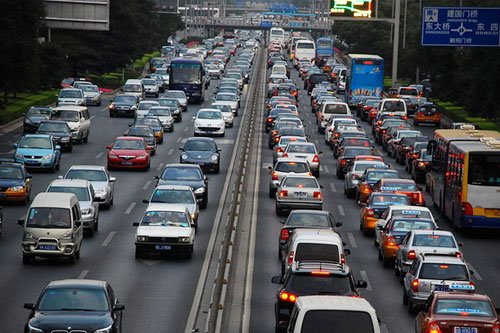当前位置: Language Tips> 双语新闻
【Reporter's Log】We should follow London's lead to manage our traffic

|
It was 8 am when I was crowded on a platform on Beijing's Line 5 in the northern part of the city. I was trying to squeeze into a peak-hour subway train to reach a destination in the south before 9:30 am, but I failed on my first five attempts. Racing against the time, I gave up the subway for a cab instead. I thought to myself, "Well, even if it's much more pricey, it's OK as long as I could be on time." I soon realized I was totally wrong when the cab got stuck in traffic on the fourth ring road. Luckily, I left my apartment quite early and still managed to get there just on time, but the infamous Beijing traffic made pine for my days in London. The British capital is vast and populated, too. It has a higher car density per square kilometer than Beijing. But the traffic management is far better. London Mayor Boris Johnson published an article after his China visit a few weeks ago to praise the high-speed railway connecting Beijing and Shanghai. Despite this state-of-the-art project, Chinese cities actually have a lot to learn from London, particularly on urban transport. It is conventional Chinese wisdom that bigger roads make traffic less congested. But why is Beijing, with rings of huge roads, still so jammed? That's definitely not the case in London. Even Euston Road, a road in London with two lanes in each direction, is much smaller than most roads in Beijing. With few big roads, London's road traffic map is like a cobweb of small streets, offering drivers more alternatives when one road is blocked. But most drivers in Beijing only have big ring roads to choose from, leaving them with very few alternatives. London does not merely rely on the road. It has a comprehensive transit system that includes a 150-year-old tube, railways to nearby suburban areas and waterways. This system is intelligent and offers a range of choices to commuters. China's major cities, like Beijing and Shanghai, can learn from this example. The nation is currently undergoing an ambitious and tremendous process of urbanization. Rather than investing money heavily into state-of-the-art towers or skyscrapers, hopefully the decision-makers could take the chance to make our urban transport more efficient and intelligent to benefit more people.'' |
我站在拥挤的北京北部的5号线站台上时是早上8点。我只是想挤进这个早高峰时段的地铁,能在上午9:30以前到达位于市南的目的地,但是尝试了五次都失败了。 因为要和时间赛跑,所以我放弃了地铁改乘出租车。 我心里想:“好吧,只要能按时到,贵点也值了。” 但当出租车被堵在第四环路时,我很快意识到自己完全错了。 幸运的是,我很早就从公寓出发了,最终还是设法准时到了,但是臭名昭著的北京交通让我想起了在伦敦的日子。 伦敦面积也很大,人口也众多。每平方公里的车辆密度比北京要大,但其交通管理却比北京好得多。 伦敦市长鲍里斯·约翰逊几周前访华,之后他发表了一篇赞美连接北京和上海的高速铁路的文章。 尽管有这个最先进的项目,但中国的城市的确有很多方面要向伦敦学习,尤其是城市交通。 中国传统智慧认为路越宽越多,交通就越不堵塞,但为什么北京交通网这么发达却还那么堵? 伦敦的情况并非如此。甚至是每个方向有两车道的尤斯顿路,也比北京大多数的路窄很多。 伦敦几乎没有很宽的路,它的交通地图就像小街道的密密麻麻的蜘蛛网一样,即使一条路不通司机也有诸多选择。 但大多数北京的司机仅有大环线道路这一选择,他们的选择余地很小。 伦敦并不仅仅依赖道路。它有一个综合的交通系统,包括一个150年的隧道、到附近郊区的铁路和水路。该系统是智能化的,能为乘客提供大量选择。 中国的大城市例如北京、上海等,可以从这个例子中学习。 中国正在雄心勃勃地推进规模巨大的城市化进程。 希望决策者可以利用这个机会使我们的城市交通更加高效和智能化,能让更多人受惠,而不是投资建立现代化的高楼或摩天大楼。 相关阅读 (中国日报记者谢煜报道 翻译:刘心玉) |
上一篇 : 中国首富拟建世界顶级奢华影都
下一篇 : 德国警官涉嫌杀人食人被捕
关注和订阅


电话:8610-84883645
传真:8610-84883500
Email: languagetips@chinadaily.com.cn